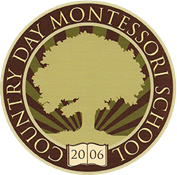The Montessori program at Country Day Montessori School is structured into the following levels:
|
Country Day Montessori School of Raleigh provides a Montessori developmentally appropriate programs for children from six weeks to six years of age. We stress rich learning experiences that stimulate children intellectually and give them an opportunity to master skills while they are learning.
The program embraces and follows the core values of a Montessori curriculum, which are to foster Independence, Coordination, Concentration and Order. Each child participates at his/her own pace under the guidance of their prepared teacher in a prepared environment.
The school programs are geared to meet the physical, social, emotional and educational needs of the individual at his or her own readiness level. We take into consideration each child’s particular stage of growth and development.
A Montessori education is an educational approach developed by Italian physician and educator Maria Montessori. She believed in freedom within limits, and respect for a child’s natural psychological, physical, and social development. Based on her observations, Montessori believed that children are at liberty to choose and act freely within an environment prepared according to her model and that they would act spontaneously for optimal development. The function of the environment is to allow the child to develop independence in all areas.
The Country Day Montessori Infant Program
A second Older Infant room has a capacity of four children. It is designed for infants that are starting to walk and can begin to learn to sit at a table for meals and to work. These children sleep on a cot instead of in a crib.
A sense of order and routine allows for the child to feel safe, cared for, loved and for strong bonds and attachment to take place. Through the environment’s simplicity and order the room is safe, secure, stimulating, and most importantly full of nurturing.
The classrooms focus on two basic needs of the infant—a safe, bonded relationship between adult and child and the development of the child’s growing sense of self and independence
The Country Day Montessori Log Cabin Program
This classroom is well prepared for the child to begin demonstrating their new-found sense of independence. The simplicity and order of the prepared environment supports safe discovery of the world as the child sensorially explores the environment at their own pace.
At this age the child embraces learning through curiosity, gaining the sense of self, and their relationship with the environment and with others. They work on enhancing their eye, hand, and motor coordination through games and music. They use naturally occurring daily activities and routines to guide their learning experiences through movement, exploration and early literacy. They are encouraged to apply their skills of self-help to foster independence and self-mastery through the use of developing language.
In the Log Cabin students are introduced to early Montessori materials and the Montessori philosophy of Grace and Courtesy
The Country Day Montessori Children's House 3 Program
The Children’s House 3 is a toddler program for children 24-36 months and up. The environment is arranged to take advantage of the toddler’s natural drive to act independently. The children are able to exercise their abilities to take care of themselves and their environment. They are given lessons on how to respect their materials and to work with them properly. They take an active role in maintaining their classroom materials and are taught how to do so in group and individual lessons. Country Day Montessori advances each child's growth and development through the rich and well-prepared environment. The important lessons of care of self are constantly being developed through lessons of Grace and Courtesy as well as self-care. This includes lessons like respecting each other’s work and work space, hand washing, putting on your coat, how to greet each other, how to clean up after you finish a work, and how to treat others with dignity and respect.
Dedicated, nurturing and trained teachers implement a Montessori designed curriculum to foster Independence, Coordination, Concentration and a Sense of Order. A great sense of independence and accomplishment is evident for a child in this classroom when they realize they are fully toilet trained.
The classroom is a special place for the young child to begin his/her steps towards independence and self-reliance.
The Country Day Montessori Children's House Program
This is a multi-age classroom with children from three to six years of age. The children enter into this classroom after they are fully toilet trained and are working well independently. While in Children House 3 the Montessori philosophy of independence, coordination, concentration and order where introduced, in this classroom the children are able to exercise in five distinct areas that define the specially prepared environment;
- PRACTICAL LIFE: This area enhances the development of hand-eye coordination, gross motor control, and cognitive order through care of self, care of the environment, development of social relations and coordination of physical movement.
- SENSORIAL: enables the child to order, classify and describe sensory impressions in relation to length, width, temperature, mass, color, pitch, etc.
- MATHEMATICS: This area enables the child to internalize concepts of number, symbol, sequence, operations, and memorization of basic facts through the use of specially designed manipulative materials.
- LANGUAGE ARTS:This area incorporates all language development, oral and written expression, reading, the study of grammar, creative dramatics, and children’s literature. Basic skills in writing and reading are developed through the use of sandpaper letters, alphabet cut-outs and various presentations, allowing children to link sounds and letter symbols effortlessly, and to express their thoughts through writing.
- CULTURAL ACTIVITIES: This area exposes the child to the basics in geography, history, life sciences, earth sciences, music, art, and movement education through the integrated cultural alphabet that is a hallmark of a Montessori education.
